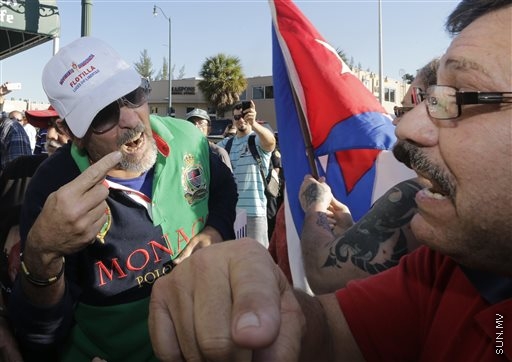
MIAMI (AP) — President Barack Obama's surprise move to re-establish ties with Cuba was applauded by the men and women in a barbershop on Calle Ocho, the heart of Miami's Cuban exile community. Waitresses stopped serving coffee at the El Pub restaurant as Obama spoke on TV. One wiped a tear from her eye as she clasped her hands, overcome with emotion at changes no one believed would come.
Only several dozen people attended Wednesday's hastily organized protests in Little Havana following the surprise announcement, a reflection of just how much the Cuban-American community has changed since the Cold War days when the U.S. began trying to isolate Cuba's communist government.
Among them was John Hernandez, holding a "Fire Obama" sign.
"We shouldn't do business with dictators. They're assassins. They have killed Americans before," said Hernandez, whose mother, father and sister fled Cuba in the 1960s before he was born in the U.S. "I feel disgraced."
Local leaders and activists said they expected more protests in the coming days. Still, the muted initial reaction to Obama's vows to encourage bilateral flows of people, information and business while working with Congress to end the 50-year-old trade embargo was strikingly at odds with outdated ideas about what most Cuban-Americans want.
It was long thought that no one could win Florida and become president without support from Cuban- Americans dead set against anything seen as supporting Cuban leaders Fidel and Raul Castro. And former Florida Gov. Jeb Bush, now mulling a presidential run, has called for a hard line on Cuba.
But Obama won the state twice while promising to improve U.S.-Cuba relations, and he's already taken lesser steps that have drawn significant support from Cuban-Americans.
That support comes in part from the thousands of Cubans who regularly travel between Havana and Miami thanks to Obama, and behind the scenes lobbying by Cuban-American business leaders who might have opposed such overtures in decades past.
"We have long advocated for steps that improve human rights and opportunity for the Cuban people and which break the isolation between our two countries. The steps taken today by the governments of the U.S. and Cuba are historic," said Carlos Saladrigas, chairman of the business-backed Cuba Study Group.
Most of the 2 million Cubans living in the United States call Florida home, and Little Havana has long been the go-to place for demonstrations aimed at isolating the Castros. Cuban artists who tried to perform in Miami were threatened; those who dared perform in Cuba were shunned. But such efforts have faded, and the latest protests tend to draw the same small group of activists.
Recent polls have shown Cuban-American voters in Miami to be evenly divided on the embargo. And while Obama's announcements outraged some Cuban exiles, others were elated.
"It's another betrayal not only of the Cuban people but of the American people," said businesswoman Remedios Diaz-Oliver, a board member of the U.S.-Cuba Democracy PAC that lobbies for a hard line.
"This is Bay of Pigs Two," she said, comparing it to the ill-fated U.S.-backed invasion of the island in 1961, when President John F. Kennedy failed to provide promised backup to Cuban exile fighters.
But Daniel Lafuente, the 27-year-old founder of tech hub LAB Miami, said "this is like a new age. It has reinvigorated the talks surrounding U.S.-Cuba relations, and for me that's the more important thing."
Lafuente grew up hearing his mother and grandfather talk of their exile. He watched the Arab Spring uprisings with dismay, thinking the U.S. and Cuba were frozen stuck.
"Now there's going to be a greater enthusiasm for trying out new means of interacting economically, socially, culturally. It's a really big step. Cuba is back on the map," he said.
Lafuente and most other Cuban-Americans remain strongly opposed to the Castros, but after so many years of heartbreak and strained expectations, they are less likely now to insist on trying to isolate their communist government.
Younger generations and the more recently arrived tend to be more open to exchange and dialogue. Older exiles whose relatives were killed or imprisoned following the 1959 revolution are less likely to approve of a thaw.
But there are exceptions at all ages: Cuban-born Raul Hernandez, 60, has lived in Miami for 35 years and has two brothers still in Cuba. Travel restrictions kept him from seeing his parents before they died. "I think the embargo has not been good for the Cuban people because the government never changed," he said.
Ramon Saul Sanchez, who runs a group dedicated to helping new arrivals from Cuba, said Obama's "radical step" will force people in Florida who are passionate about Cuba to become more engaged.
"This isn't a setback — it's actually a challenge" for an exile community accustomed to business as usual, he said.